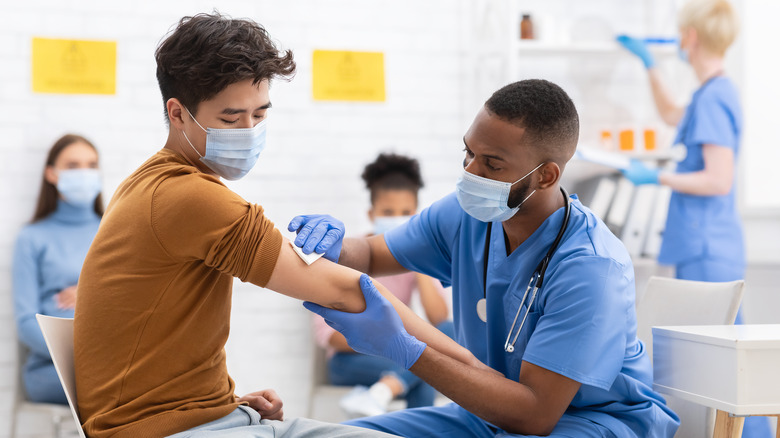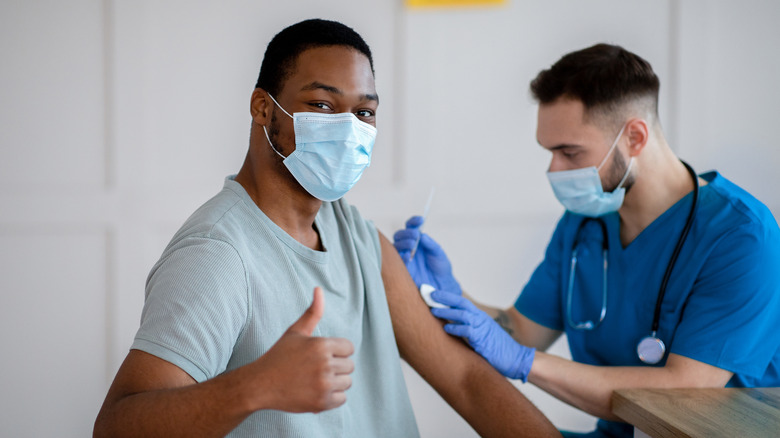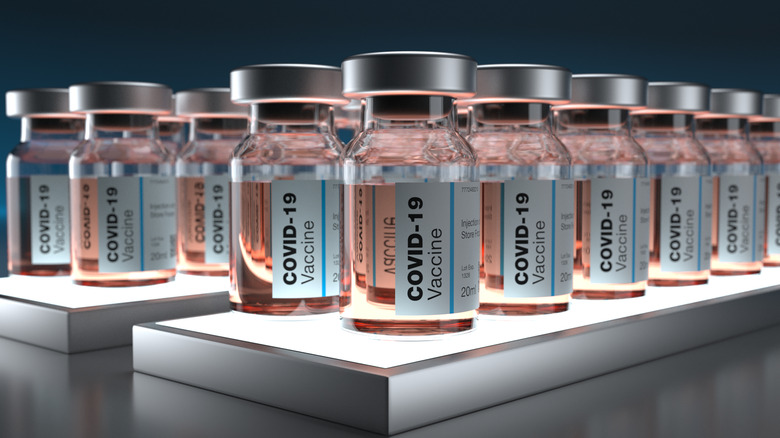When Will Every American Be Vaccinated For COVID-19?
When President Biden took office in January, he set a goal for the United States to administer 200 million COVID-19 vaccine shots in his first 100 days in office. A few days short of the hundred-day mark, we met that goal, which made the future look promising, but we quickly realized that we have a long way to go before we can really put the coronavirus in the rearview mirror for good.
Vaccination rates started out strong, and in some places, it seemed like you couldn't get a vaccine soon enough: People were lining up in their cars and refreshing website pages to schedule appointments. But in other places in the country, it's been a struggle to convince people to get vaccinated. The most current data shows that about 50 percent of the U.S. population has been vaccinated, but the rate at which people are showing up to get their shot has declined since April (via Time). Is the goal of getting every American vaccinated for COVID-19 attainable? Is it even possible?
What are the barriers threatening vaccination rates?
Back in June, President Biden set another goal: to have 70 percent of Americans vaccinated for COVID-19 by the Fourth of July (via White House). He was no doubt trying to tempt us with a good time: If we can just do what we're supposed to and get vaccinated, we could have the Fourth of July back, just like the good old days before the pandemic. However, as vaccination rates slowed and July approaches, it looks as though Biden's goal is not going to happen. The White House's National Month of Action attempts to remove all possible barriers for people who are not getting vaccinated, but it seems that there is still some resistance to the COVID-19 vaccines.
What reasons do people have to not get the vaccine? As a country, we're making good progress, but Dr. Anthony Fauci, the trusted source on infectious diseases and COVID-19 throughout the pandemic, still says that we need to reach 70-90 percent inoculation in order to reach herd immunity, which is what it will take for things to truly get back to normal (via Washington Post).
Some reasons that Americans have cited as reason enough not to get vaccinated are concern about vaccine side effects, lack of access, or mistrust surrounding the vaccines, whether that is mistrust in the vaccine itself or the institutions that recommend it (via Vox).
What can we do to get more people vaccinated?
In order to combat the issue of accessibility to COVID-19 vaccines, the Biden Administration included a number of measures in the National Month of Action campaign, including childcare options for people who want to get vaccinated and extended pharmacy hours for those who might work past the regular pharmacy operating hours (via White House).
Individual states and businesses are also offering prizes and giveaways in an attempt to encourage Americans to get vaccinated (via CNBC). States like Colorado are entering vaccinated citizens in a lottery, where they have a chance to win $1 million (via The Gazette). The White House announced on June 10 that they will donate half a billion COVID-19 vaccines to other countries in need, so it would appear that not having enough doses to vaccinate every American is not the issue: It's a matter of convincing people that getting a COVID-19 vaccine is important and worthwhile.
Another thing that may get more Americans vaccinated is a pending FDA approval of the COVID-19 vaccines, not just for emergency use. One-third of US citizens say that the FDA approval is what they're waiting for, because they don't currently trust the vaccines being administered (via ABC). And although experts and medical professionals still say that you shouldn't wait to receive a COVID-19 vaccine if you're eligible, the FDA's approval of the vaccines may be what it takes to push the United States over that 70 percent mark in order to get closer to herd immunity.



